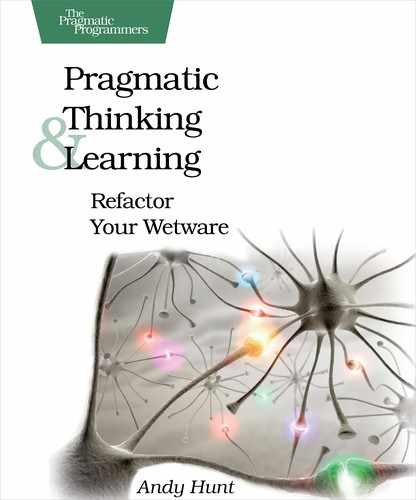Consider the Context, Again
One of the most important lessons from the Dreyfus model is the realization that although the novice needs context-free rules, the expert uses context-dependent intuition.
The man with his pickled fish has set down one truth and has recorded in his experience many lies. The fish is not that color, that texture, that dead, nor does he smell that way.
➤ John Steinbeck, The Sea of Cortez
In The Log from the Sea of Cortez [Ste95], Steinbeck muses on the interplay of context and truth. You can describe a Mexican Sierra fish in the laboratory. All you have to do is “open an evil smelling jar, remove a stiff colorless fish from formalin solution, count the spines, and write the truth ‘D. XVII-l5-IX.’” That’s a scientific truth, but it’s devoid of context. It’s not the same as the living fish, “its colors pulsing and tail beating in the air.” The living fish, in the context of its habitat, is a fundamentally different reality from the preserved fish in the jar in the lab. Context matters.
You may have noticed that the high-priced consultant’s favorite answer is “It depends.” They’re right, of course. Their analysis depends on a great many things—all those critical details that the expert knows to look for, while ignoring the irrelevant details. Context matters.

You might ask the expert to open a locked door. Fair enough, but consider the difference context might make: opening the door to rescue the baby on the other side in a burning house is quite a different exercise than picking the lock and leaving no traces at the Watergate Hotel, for instance. Context matters.[25]
There is an inherent danger in decontextualized objectivity, that is, in trying to be objective about something after taking it out of its context. For instance, in the previous Steinbeck quote, a preserved fish—perhaps dissected for study—is quite a different thing from the silvery flashing beast gliding through a cresting wave.
Beware decontextualized objectivity.
For the breaking-and-entering example, “I want to open this locked door” really isn’t sufficient. What’s the context? Why does the door need to be opened? Is it appropriate to use an axe, a chainsaw, or lock-picking tools, or can we just go around back and use the other door?
In systems thinking, as in object-oriented programming, it’s often the relationships between things that are interesting, not the things themselves. These relationships help form the context that makes all the difference.
Context matters, but the lower several stages on the Dreyfus model aren’t skilled enough to know it. So once again, we have to look at ways of climbing the Dreyfus ladder.
